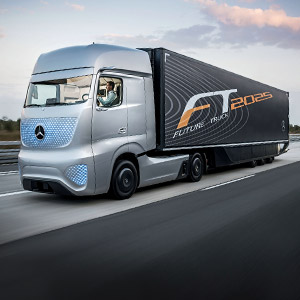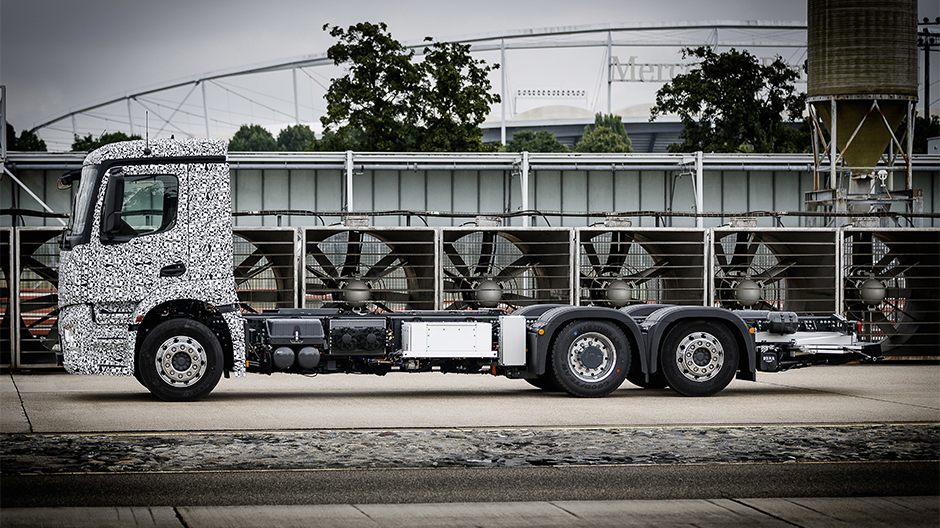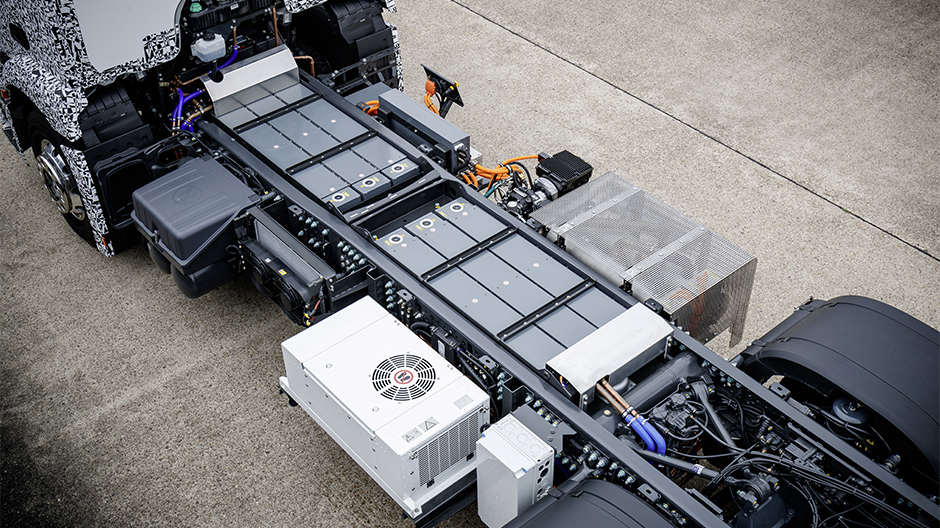
Mercedes-Benz eActros
eActros
The world’s most successful truck manufacturer Daimler Trucks is presenting the Mercedes-Benz eActros in Stuttgart today, as the first fully electric truck with an admissible total weight of up to 26 tonnes.

Mercedes-Benz Trucks; eActros; Electro-Lkw; world premiere; electric mobility; modular battery concept; distribution.
This means that in the future, heavy trucks will take part in urban distribution operations with zero local emissions and hardly a whisper. The market launch of this technology is conceivable for Daimler Trucks at the beginning of the next decade. In the light distribution sector, Daimler Trucks has already been impressively demonstrating the day-to-day suitability of the fully electric truck in customer trials with the Fuso Canter E-Cell since 2014. The development of electric trucks and series production maturity are fixed parts of the strategy of Daimler Trucks to build on our technological leadership. For this purpose a considerable part of the future investments by the truck division in the fields of research and development flow in the further development of the full electric drive.
"Electric drive systems previously only saw extremely limited use in trucks. Nowadays costs, performance and charging times develop further so rapidly that now there is a trend reversal in the distribution sector: the time is ripe for the electric truck. In light distribution trucks, our Fuso Canter E-Cell has already been undergoing intensive customer trials since 2014. And with the Mercedes-Benz eActros, we are now electrifying the heavy distribution segment up to 26 tonnes. We intend to establish electric driving as systematically as autonomous and connected driving," says Dr Wolfgang Bernhard, responsible for Daimler Trucks & Buses at the Board of Management.
Growing urbanisation requires fully electric trucks.
Better air quality, lower noise and restricted-access zones are now important keywords in large metropolises worldwide, because more and more people worldwide are moving to cities. 2008 was the first year in which more people lived in cities than in the countryside. The trend is continuing: The UN predicts a global population of nine billion people by 2050, with approximately 70 percent of them living in cities. In future, it will be necessary to transport goods in urban environments for increasing numbers of people – and with the lowest possible emissions and noise. By now large cities such as London or Paris are considering a ban on internal combustion engines in city centres in the future. That means: there will be fully electric trucks ensuring the supply of humas with food or other goods of daily needs.
Fast enhancement of battery capacity while significantly lower costs.
Until quite recently, the use of fully electric drives systems in trucks seemed to be unimaginable – especially because of the high costs of the batteries coupled with a low range. The technology has now become much more mature. In particular battery cells rapidly developing further. Daimler Trucks expects the costs of batteries to lower by the factor 2.5 between 1997 and 2025 – from 500 Euro/kWh down to 200 Euro/kWh. At the same time, performance will improve by the same factor over the same period – from 80 Wh/kg up to 200 Wh/kg.
Stefan Buchner, Head of Mercedes-Benz Trucks:
"With the
Mercedes-Benz eActros, we are underlining our intention to
systematically developing the electric drive in trucks to series
production maturity. This means that we will begin to integrate
customers, so as to gain valuable joint experience with respect to the
operating ranges and the charging infrastructure in daily transport
operations. Because we think the entry of this technology into the
series production is already conceivable at the beginning of the next decade."

Innovative battery technology for eActros.
Technically the Mercedes-Benz eActros is based on a heavy-duty, three-axle short-radius Mercedes-Benz distribution truck. In addition, however, the developers at Daimler Trucks have totally revised the drive concept: The entire conventional drivetrain being replaced by a new electrically driven rear axle with electric motors directly adjacent to the wheel hubs – derived from the electric rear axle which was developed for the Mercedes-Benz Citaro hybrid bus. The power is supplied by a battery pack consisting of three lithium-ion battery modules. This results in a range of up to 200 km – enough for a typical daily delivery tour. Thanks to the integrated concept with motors adjacent to the wheel hubs, the batteries are housed in a crash-proof location inside the frame.
As the EU Commission is in favour of increasing the permissible gross vehicle weight of trucks with alternative drives by up to one tonne, this will more or less level out the weight surplus of the electric drive. This will raise the permissible gross vehicle weight of the eActros from 25 to 26 tonnes, which will bring the original extra weight down to 700 kg compared with a directly comparable IC-engined truck.


Comment
Please log in to post a comment.
No comments yet